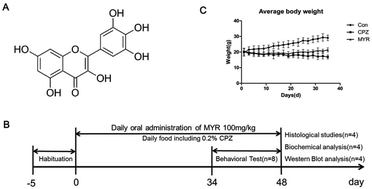Myricetin alleviates cuprizone-induced behavioral dysfunction and demyelination in mice by Nrf2 pathway
Abstract
Multiple sclerosis (MS) is a demyelinating disease occurring in the central nervous system. In the present study, we evaluated the function of myricetin on the alleviation of behavioral dysfunction and myelin protection in the cuprizone-induced demyelination model. Mice were daily fed with fodder including 0.2% cuprizone and were administrated myricetin (100 mg kg−1) by gavage administration for 5 weeks. The treatment of myricetin ameliorated hyper-locomotion and behavior impairment induced by cuprizone toxicity. With the administration of myricetin, the demyelinating lesion was lessened via increasing the LFB staining area and myelin phosphatide protein (MBP) expression. In addition, myricetin evidently promoted Nrf2 translocation in the nuclear fraction and enhanced the HO-1 and NQO1 expression levels. Our data revealed that myricetin may be a potential candidate for mitigating motor defects and demyelination in a cuprizone-induced mouse model via activating the Nrf2 pathway.


 Please wait while we load your content...
Please wait while we load your content...